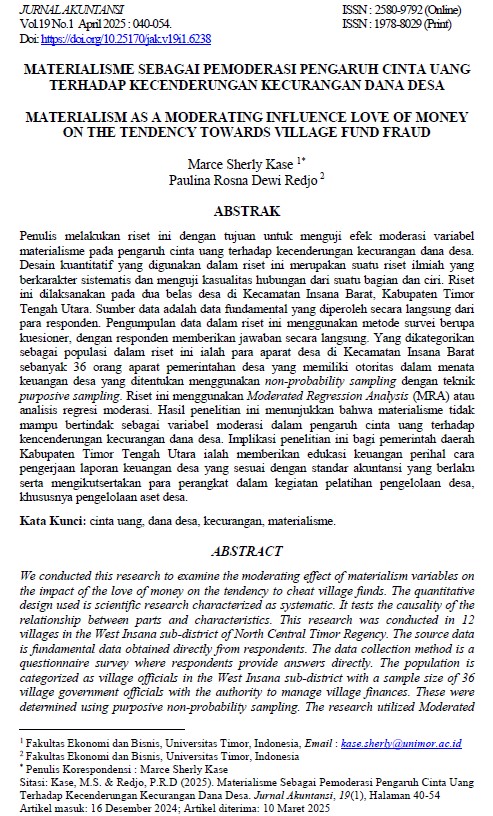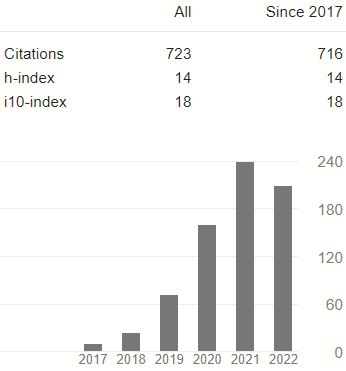MATERIALISM AS A MODERATING INFLUENCE LOVE OF MONEY ON THE TENDENCY TOWARDS VILLAGE FUND FRAUD
DOI:
https://doi.org/10.25170/jak.v19i1.6238Keywords:
fraud , Love of money, materialism, village fundsAbstract
We conducted this research to examine the moderating effect of materialism variables on the impact of the love of money on the tendency to cheat village funds. The quantitative design used is scientific research characterized as systematic. It tests the causality of the relationship between parts and characteristics. This research was conducted in 12 villages in the West Insana sub-district of North Central Timor Regency. The source data is fundamental data obtained directly from respondents. The data collection method is a questionnaire survey where respondents provide answers directly. The population is categorized as village officials in the West Insana sub-district with a sample size of 36 village government officials with the authority to manage village finances. These were determined using purposive non-probability sampling. The research utilized Moderated Regression Analysis (MRA) or moderated regression analysis. This research found that materialism could not act as a moderating variable in the effect of love of money on the tendency to cheat village funds. The implications of this research for the local government of North Central Timor Regency are to provide financial education on how to work on village financial reports per applicable accounting standards and to include village officials in village management training activities, especially village asset management.
References
Azisah, N. (2017). Pengaruh Love of Money dan Kecerdasan Spiritual terhadap Kecenderungan Fraud Accounting pada Penggunaan Dana Desa dengan Gender sebagai Variabel Moderating. Skripsi. Universitas Islam Negeri Alauddin Makassar.
Dewi, N. L. P. A. S., & Sumadi, N. K. (2020). Pengaruh Keadilan Distributif, Kepatuhan Pengendalian Internal, dan Love of Money terhadap Kecenderungan Kecurangan Penggunaan Dana Desa. Hita Akuntansi dan Keuangan, 1(2), 762-797.
Farhan, M., Helmy, H., & Afriyenti, M. (2019). Pengaruh Machiavellian dan Love of Money terhadap Persepsi Etika Penggelapan Pajak dengan Religiusitas sebagai Variabel Moderasi. Jurnal Eksplorasi Akuntansi, 1(1), 470-486.
Gayatri, L.M.Y., & Widhiyani N. L.S (2017). Transpransi dan Akuntabilitas Pengelolaan Keuangan Dana Desa untuk Mendorong Kemandirian Masyarakat Pedesaan. Jurnal Ekonomi Kuantitatif Terapan, 10(2),175-182.
Giovano, A., Wibowo, A. S., & Yanuarisa, Y. (2020). Pengaruh Love of Money dan Religiusitas terhadap Kecenderungan Fraud Accounting Dana Desa dengan Gender sebagai Variabel Moderasi pada Desa di Kecamatan Katingan Tengah. Jurnal Balance: Media Informasi Akuntansi dan Keuangan, 12(2), 11-24.
Ghozali, I. (2018). Aplikasi Analisis Multivariate dengan Program IBM SPSS 25. Badan Penerbit Universitas Diponegoro.
Hafizhah, I., Basri, Y. M., & Rusli. (2016). Pengaruh Etika Uang terhadap Kecurangan Pajak dengan Religiusitas, Gender dan Materialisme sebagai Variabel Moderasi. Jurnal JOM FEKON, 3(1), 1652-1665.
Kase, M.S, Suprasto, H.B, & Sari, M.M.R. (2017). Conscientiousness dan Agreeableness sebagai Pemoderasi Pengaruh Love of Money pada Tax Evasiontendency Mahasiswa Magister Akuntansi. E-Jurnal Ekonomi dan Bisnis Universitas Udayana, 6(10), 3665-3696.
Kase, M.S, Babulu, N.L. (2023). The Effect of Love of Money and Intrinsic Religiosity on the Tendency of Village Fund Accounting Fraud. International Journal of Science and Societ, 5(4), 393-403.
Lodja, I. (2021). Korupsi Dana Desa Rp 1,3 Miliar, Kepala Desa di TTU jadi Tersangka dan Ditahan Jaksa. https://www.katantt.com/artikel/41281/korupsi-dana-desa-rp-13-miliar-kepala-desa-di-ttu-jadi-tersangka-dan-ditahan-jaksa/
Manoe, R. V. (2014). Pengaruh Idealisme, Relativisme, dan Materialisme terhadap Pandangan akan Peran Etika dan Tanggung Jawab Sosial Perusahaan (TJSP). Skripsi. Universitas Atma Jaya Yogyakarta.
Muhaimin, (2021). Pengaruh Love of Money dan Religiusitas terhadap Fraud Accounting Anggaran Dana Desa pada Kecamatan Sinjai Tengah. YUME: Journal of Management, 4(2),121-133.
Suprajadi, L. (2009). Teori Kecurangan, Fraud Awareness, dan Metodologi untuk Mendeteksi Kecurangan Pelaporan Keuangan. Bina Ekonomi Majalah llmiah Fakultas Ekonomi Unpar, 13(2), 52-58.
Rebon, D. (2021). Diduga Lakukan Penyelewengan Dana Desa, di TTU Kades Oekopa Dilaporkan ke Aparat Penegak Hukum. https://kupang.tribunnews.com/2021/02/05/diduga-lakukan-penyelewengan-dana-desa-di-ttu-kades-oekopa-dilaporkan-ke-aparat-penegak-hukum-info?page=all
Tang, T. L. . (1992). The Meaning of Money Revisited. Journal of Organizational Behavior. Journal of Organizational Behavior, 13, 197–202.
Tang, T. L. P. (2002). Is the Love of Money the Root of All Evil? Or Different Strokes for Different Folks: Lessons in 12 Countries. Paper presented to the International Conference on Business Ethics in the Knowledge Economy. Hong Kong, China.
Tang, T. L. P., & Chen, Y. J. (2008). Intelligence vs. Wisdom: The Love of Money, Machiavellianism, and Unethical Behavior across College Major and Gender. Journal of Business Ethics, 82(1), 1-26
Widiyarta, K., Herawati, N. T., Ak, S. E., & Atmadja, A. T. (2017). Pengaruh kompetensi aparatur, budaya organisasi, whistleblowing dan sistem pengendalian internal terhadap pencegahan fraud dalam pengelolaan dana desa (Studi empiris pada pemerintah desa di Kabupaten Buleleng). JIMAT (Jurnal Ilmiah Mahasiswa Akuntansi) Undiksha, 8(2).

Downloads
Published
Issue
Section
License
Copyright (c) 2025 Marce Sherly Kase, Paulina Rosna Dewi Redjo

This work is licensed under a Creative Commons Attribution-ShareAlike 4.0 International License.
Authors who publish with this journal agree to the following terms:
- Authors retain copyright and grant the journal right of first publication with the work simultaneously licensed under a Creative Commons Attribution-ShareAlike 4.0 International License that allows others to share the work with an acknowledgment of the work's authorship and initial publication in this journal.
- Authors are able to enter into separate, additional contractual arrangements for the non-exclusive distribution of the journal's published version of the work (e.g., post it to an institutional repository or publish it in a book), with an acknowledgment of its initial publication in this journal.
- Authors are permitted and encouraged to post their work online (e.g., in institutional repositories or on their website) prior to and during the submission process, as it can lead to productive exchanges, as well as earlier and greater citation of published work.














